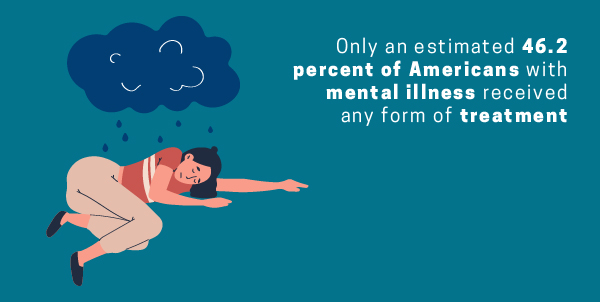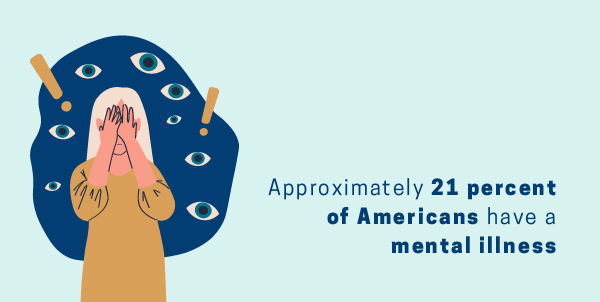What is Mental Illness?
However, of this number, only a little less than half of people will receive any sort of medical treatment to help treat their mental illness. Untreated mental illness can make it difficult for an individual to manage day to day tasks and activities, including maintaining relationships with their loved ones, whether those be romantic or platonic.
A mental illness is any type of disorder that affects an individual mentally, emotionally, or behaviorally. These can range from PTSD, to anxiety, to mood disorders. While a mental illness can have physical signs and symptoms and impact the body that way, they are not a physical illness. Instead, they impact the brain, which then can lead to other issues for the individual.1

Do Relationships with a Mentally Ill Person Last?
The Most Common Mental Illnesses
Rundown of Common Mental Illnesses
Anxiety Disorder
There are several different types of anxiety disorders, including generalized anxiety disorder (GAD), panic disorder, and social anxiety disorder (SAD). According to the National Institute of Mental Health, over 30% of Americans will suffer from some form of anxiety disorder during their life.
Depressive Disorders
Depression can occur as the result of an event or due to fluctuations in the body’s natural brain chemistry, and it can inhibit an individual from living their life the way they want to. Individuals with depression may struggle to get out of bed each day, and they may not have the same joy that used to have when doing activities.3
Substance Use Disorder
Substance use disorders (SUD) affect a person’s ability to control their use of substances. These substances can range from alcohol to opiates to other addictive drugs.
- Anxiety
- Depression
- Post-traumatic stress disorder
- Mood disorders4
Signs and Symptoms of Mental Illness
Mental illness can appear in many different forms. Depending on the exact type of mental illness, there may be physical, mental, or behavioral signs and symptoms that can aid in a diagnosis. While treatment is designed to address the root of mental illness, it can also help in reducing the severity of these symptoms.
Physical Signs
Psychological Signs
- Uncontrollable or excessive emotions
- Extreme mood changes or swings
- Irrational or irregular anxiety or worry
- Unclear or confused thinking
- Prolonged depression
- Irritability
Behavioral Signs
- Isolation or avoidance
- Loss of joy in activities
- Changes in personality
- Difficulty concentrating
- Withdrawal from family and activities
Additional Symptoms of Mental Illness
Types of Relationships that Mental Illness Can Affect
Mental Illness and Romantic Relationships
Mental Illness and Family Relationships
Mental illness and family relationships can be a tricky topic to approach. While there is the benefit of having already built trust and knowledge with your family, which can help decrease the stressful aspect of the conversation, mental illness may also stem from familial problems. Family counseling can offer a safe, welcoming environment where both you and your family can discuss your feelings and mental illness, helping to cultivate a strong support system.
Social Relationships and Mental Health
How Does Mental Illness Affect Relationships?

Shame and Guilt
Intimacy Problems
The Risk of Codependent Behaviors
- Manipulation
- Self-sacrifice or “people pleasing”
- Lack of boundaries
- Taking the blame for other people’s mistakes or complications
Some Tips to Help Mentally Ill Partners and Family Members

Be Supportive
Don't Become Their Therapist
Set Boundaries
Practice Self-Care
Seek Professional Help if Needed
One of the most important things to remember is that you are their support system: not a licensed counselor. There are many aspects of mental illness that you may not be prepared to handle, which is completely okay. However, you may find that there is a time where you will need to seek out professional help for the individual.
Do’s and Don’t of Mitigating Mental Illness in Relationships
Treatment for Mental Illness in California
Mental illness can be difficult to navigate. However, there are holistic options available to help families reconnect and find peace once more. At Pacific Beach Health, you’ll find a unique mental illness treatment plan that integrates spirituality into health care by promoting connection not only to one another but to the earth, mind, and spirit as well.

Mental Illness Treatment Programs at Pacific Beach Health
Pacific Beach Health offers a variety of mental health services designed to help restore balance by targeting mental illness from a holistic perspective. Here, patients will be given a safe environment to reconnect with themselves, their families, and their spirituality through grounding exercises and professional therapy sessions.
Couples Therapy
Family Therapy
While mental illness can take a toll on relationships, or even be the result of already strained relationships, family therapy can provide a beneficial and natural way to address the root cause while also building a healthy support system.
Other Therapies
Other types of therapies can be beneficial in helping the individual better reconnect with themselves and realign their mind, body and spirit. At Pacific Beach Health, you can find research-backed psychotherapy and holistic mind-body wellness practices with holistic roots. Our unique ecopsychology methods take advantage of the best of what the Pacific Beach Health has to offer in terms of advanced, natural healing.
Get Help Today
Mental illness can be difficult to navigate, whether for the individuals themselves or their families and loved ones. However, treatment is available. Reach out to Pacific Beach Health today to start your mental health journey and reconnect with the things that matter most.
Resources
- https://www.nimh.nih.gov/health/statistics/mental-illness
- https://www.nimh.nih.gov/health/statistics/any-anxiety-disorder
- https://www.nimh.nih.gov/health/statistics/major-depression
- https://www.nimh.nih.gov/health/topics/substance-use-and-mental-health
- https://bmcpublichealth.biomedcentral.com/articles/10.1186/1471-2458-12-735


